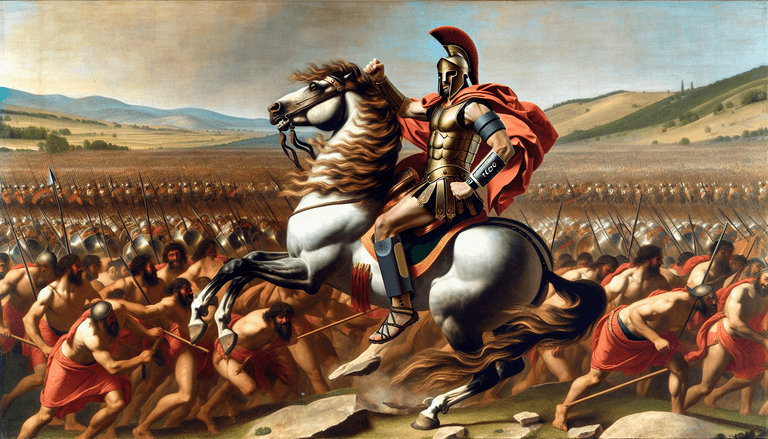Picture this: Alexander the Great, famed conqueror and the Macedonian powerhouse, striding briskly across the Persian sands, but not with just any army. No, my dear reader, Alexander and his troops are sporting the latest in wrist-worn technology, Fitbits, turning history's most epic military campaigns into a step-counting, heart-rate-monitored, intrepid journey of fitness tracking.
Alexander the Great: The Original Step Master
From taming the perhaps mythological Bucephalus to winning battles that spanned continents, Alexander was always on the move. Now, cast your mind's eye back over 2,000 years and imagine how his ambitions, and his abs, might have fared if he'd swapped his sword for a sleeker accessory, a Fitbit.
With the trusty Fitbit Inspire strapped around his wrist (customised, no doubt, with a regal hue), Alexander could have managed his well-being while plotting the maps of his ever-expanding empire. The historic whims of a king would have looked very different with reminders to ‘Take a Breather’ on rest days or ‘Keep Moving’ as he crossed the formidable Hindu Kush mountains.
Armies on the Move: Fit as Fiddles
Troop management, too, would have taken a modern twist. Picture each soldier, countenance as disciplined as their step goals, lining up not at the sound of a trumpet, but at the gentle buzz of their Fitbit’s ‘Move’ reminder. Yes, the once boisterous marching tunes would play second fiddle to the rhythmic ‘boop boop’ of synchronised step tracking.
This cunning use of technology wouldn't just stop at steps and sweat. The commanding general might very well have used his Fitbit's GPS tracking to navigate unknown territories, mapping out his next conquest with ease. With sleep tracking, wake times could be optimised, ensuring every phalanx was ready to form in tip-top phalanx-ical condition by sunrise.
Marching Motives: Morale and Miscellaneous
What's more, morale would skyrocket. The only thing greater than clashing swords would be the friendly competition of daily, nay, hourly step challenges among ranks. "Challenge accepted," grunts Polyperchon from near the stables, as he overtakes Ptolemy’s step count with a determined look in his eye.
A Fitbit leaderboard would become a battleground in itself. Instead of ‘King of the Hill,’ soldiers would vie for the all-important title of ‘King of the Step Count’. Alexander, of course, would sit in the throne room of athletic supremacy, watching his men strive not just for glory, but for synchronised lifestyle heath tips.
Look Out, Aristotle!
And let us not forget the input from his venerable tutor, Aristotle. Imagine the philosopher perched in an ancient lyceum, advising Alexander not just on governance and philosophy, but on heart rates and calorie consumption. "My liege," he’d announce, with a scroll-like glance at his own screen, "your resting heart rate shows remarkable efficiency, akin to that of a Spartan, a truly philosophical state of being. Such balance in one’s physiology surely reflects harmony in one’s rule!"
The Council of Fitness would convene, indeed, discussing not only metaphysical treaties but also the merits of interval training while storming through the siege at Tyre.
Historical Outcomes: A Fitter Future?
Would Alexander's empire have stretched even further under the guiding light of a Fitbit? Could such technological foresight have prolonged his reign, physically and metaphorically, across the burning crescent of ancient lands? I dare say his heart might have beaten steadily longer, but alas, history, now recorded in steps, did not tread that digital path.
Regardless, the thought of Alexander measuring his triumphs in heartbeats pastelly cast across a touchscreen is a whimsical delight. So, the next time you check your fitness tracker, remember the hypothetical prowess of past conquerors who, had they ventured beyond the mystical mists of time, might very well have crushed their enemies not just with force, but with fervour, and a Fitbit.







